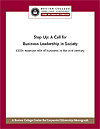 |
 |
03.06.07

CSR: A Return on Integrity The report provides the perspectives of 48 CEOs and senior executives representing 27 major multinational companies from a cross-section of industries who participated in lengthy interviews with Boston College researchers. The executives provide candid assessments about how expectations of their role are changing and the dilemmas that presents. Here are some highlights: Perspectives vary greatly. GE Chairman and CEO Jeffrey Immelt said, "Profits are created by businesses that are doing things that ultimately have real societal benefits. And businesses have not done a good a job of describing that.” While Néstle Chairman and CEO Peter Brabeck-Letmathe warned companies to “be careful what language you’re using. Because when you say you should give something back, you are intrinsically saying that you have been exploiting society. I have nothing to give back to society; I have given to society before.” Todd Thomson, Citigroup’s Chairman & CEO Global Wealth Management Division, I believe clearly laid out the issue, “Business managers should not be confused about what their objective is, what their purpose is. Their purpose is to create value for shareholders. The way to do that, however, I think is to understand all your stakeholders.” While the majority of executives did not want to turn their companies into social organizations, they did feel they have to take business’s role in society seriously. Asked to choose between five different opinions about the role of business in society, only six percent agreed with the proposition that the private search for profit advances the public good: that an executive’s duty is just to create wealth for investors. By contrast, over 50 percent believed that companies had a much more inclusive social purpose, while 15 percent felt companies should demonstrate the moral principles of capitalism. Challenging other top executives, KPMG Chairman Mike Rake said, “We need chairmen and chief executives to be courageous and determined to take a longer-term view on their business. They need to be leaders of the business in a sense that really engages their people, their stakeholders, their shareholders, their communities, in believing that what they’re doing is good for their business, good for their communities and that these are inextricably intertwined.” Tom McCoy of AMD points out that, “as business leaders, sometimes we forget the simple things about life, about what's human and what isn't. And until we really get that right, we are condemned to continue in these periodic cycles of greed and untethering from social responsibility.” The obligation would seem to be on management to create a more values-based company aligned with the values of the society in general. One executive commented, “The word that most people outside the U.S. use to describe an American business person is ruthless, and many of us take pride in the fact that we are a ruthless competitor. But the last time I looked it up in the Webster’s dictionary, ruthless wasn’t exactly a great word to be associated with. I think that the time has come for these things to move.” Companies face what GE’s Heineman called “the fundamental tension at the core of capitalism: the question of how you have the right sort of performance with integrity.” While there are all manner of small steps that could be taken to strengthen the business-society relationship, four important areas stand out as ones where progress offers enormous potential returns: • Challenging the short-term perspective of the capital markets • The respective roles of business and government in public policy • Creating a soft landing to globalization • Courageous leadership  None of these is an easy option, and they certainly do not represent a package of ideas that all executives would support. But moving the needle on any one will yield significant dividends. Ralph Shrader, Chairman & CEO Booz Allen Hamilton, concludes, “The corporation’s primary responsibility is to ensure its existence within an ethical and responsible framework. The idea of profit at any cost is something that is past its time.”
Posted by Michael McKinney at 08:51 AM
|
BUILD YOUR KNOWLEDGE
 

How to Do Your Start-Up Right STRAIGHT TALK FOR START-UPS 
Grow Your Leadership Skills NEW AND UPCOMING LEADERSHIP BOOKS 
Leadership Minute BITE-SIZE CONCEPTS YOU CAN CHEW ON 
Classic Leadership Books BOOKS TO READ BEFORE YOU LEAD |